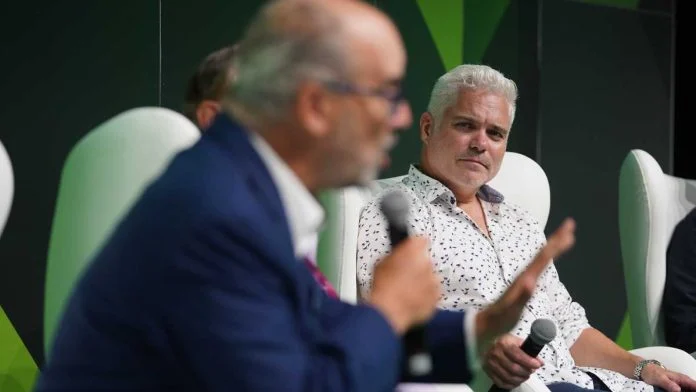Even after hearing that no other operators were coming to the first Massachusetts Gaming Commission (MGC) roundtable on limiting bettors, COO for Bally’s North America Interactive Brett Calaap told his staff there was no way they weren’t attending.
“I very, very much, told our team we’re coming to this meeting. And they were all like, ‘Oh, no one else is showing up.’ We’ve talked to our friends. They’re all going to bail at the last second/ And I was like, ‘Absolutely not. We’re not bailing on this.’ Now we have the power to choose what we share and what we don’t share, but not showing up to something isn’t acceptable at all, from my perspective,” Calaap said as part of a panel at SBC Summit Lisbon earlier this year.
Regulators need to lead the way for operators
Other panelists agreed with Calaap, including Princeton Public Affairs Group Partner Bill Pascrell III and Responsible Gambling Affiliate Association (ROGA) President George Rover. Both of them agreed that on their home turf of New Jersey, something like that simply wouldn’t happen.
“In New Jersey, no one would dare not show up,” Rover said.
“I don’t care what the rules are. You should be there,” Pascrell added.
Calaap, who joined Bally’s in June 2023, said he was surprised when visiting regulators to learn that, more often than not, members of the C-suite were not making trips to their offices.
“It’s a two-way street, and you really need to work closely with the regulator,” Calaap noted. “Because, look, we’re not always right, and they’re not always right. Sometimes we have to meet in the middle.”
The panel agreed though that it is the regulators who need to take charge because operators are simply not going to volunteer to hold back or not do things unless they are told to do so.
“As much as any operator would like to take proactive steps, as long as there’s no clear guideline from the regulator and what is expected on certain areas, there’s always going to be a very fine balance that we need to step between being compliant and proactive and also competitive. Because if I’m going to voluntarily introduce friction into my customer journey, I’m not going to be at a disadvantage versus my colleague at Bally’s,” said BetMGM VP of Product Liron Warhaftig.
Pascrell says gambling government relations need improvement
While there are trade groups that adopt codes of conduct, as questions swirl around college prop bets, responsible gambling, betting limits and other practices, it will take regulators leading the charge before operators will follow suit. Or, perhaps it might take something like the SAFE Bet Act, a proposed measure with federal oversight and minimum mandates on state sports betting regulations.
The likelihood this federal measure from Sen. Richard Blumenthal and Rep. Paul Tonko gains any traction is minimal but the response to it from the industry speaks volumes about how it handles government relations.
Pascrell said he spoke to Tonko, who told him no operator reached out to discuss the measure after it was announced.
“I understand putting the money behind player acquisition, commercialization, revenue generation, but we haven’t done a great job in America with lobbying and government relations and educating,” he added.
“We do a terrible job at the federal level. We don’t do such a great job at the state level either.”
Pascrell referenced the 60 Minutes profile as an example of how those outside the industry are perceiving gambling but also chastised it as a hit piece. However, he also acknowledged that the industry is failing to get the word out about the good that it is doing, and other panelists agree things are moving in the right direction.
“I really do think the operators have come around in the last year and a half. As a former regulator, I’m in a position to know whether they’ve been responsive or not, and I really do think the operators are taking RG very seriously,” noted Rover, whose organization represents a group of affiliates committed to responsible gambling.
Complying with tax rates is an operator game of chicken
The conversation ended with a discussion about how operators and lawmakers are interacting, particularly when it comes to taxes. Several states have hiked up the tax rate from where it initially started. New York continues to draw criticism for its 51% tax rate.
Some operators, like DraftKings and its short-lived surcharge, are threatening to make changes that would negatively impact the customer. Calaap joked that he wished they had the wherewithal to go through with it simply to see how things would shake out.
But Calaap and Warhaftig also conceded that operators are going to continue to enter markets even with adverse conditions.
“It’s almost like a game of chicken, because what do you do? You pull out and then, and then, what? And then you let your competitors take over the market, with the aspiration that at some point in the future, taxation is going to get better, but at that point you’re out of the game,” Warhaftig explained.
As Calaap noted, it is a two-way street and, at least for now, there is some traffic that is holding up operators along with regulators and lawmakers from improving the industry.



